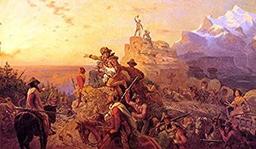
Unit 2.1 - Westward Expansion
Quiz by Kevin Benson
Feel free to use or edit a copy
includes Teacher and Student dashboards
Measure skillsfrom any curriculum
Tag the questions with any skills you have. Your dashboard will track each student's mastery of each skill.
- edit the questions
- save a copy for later
- start a class game
- automatically assign follow-up activities based on students’ scores
- assign as homework
- share a link with colleagues
- print as a bubble sheet
- Q1
How did the Louisiana Purchase affect the U.S. geographically & politically?
Doubled the size of the United States; set precedent for future land acquisitions.
slightly increased the size of the United States; caused the country to go to war with Britain.
tripled the size of the United States; allowed slavery to spread to all new territories.
300s - Q2
Jefferson had to go against his own political beliefs and use this constitutional concept to purchase Louisiana:
strict construction
judicial review
loose construction
300s - Q3
As a result of the War of 1812, the United States emerged with a stronger, but short lived, sense of:
nationalism
sectionalism
imperialism
300s - Q4
This Supreme Court case dealt with the issue of interstate commerce (trade) between states.
Gibbons v. Ogden
Plessy v. Ferguson
Tinker v. Des Moines
300s - Q5
What was a significant effect of Supreme Court decisions under Chief Justice John Marshall, including McCulloch v. Maryland (1819) & Gibbons v. Ogden (1824)?
The states were given more control over interstate commerce.
The power of the federal government over the states increased.
The president’s use of the veto power was restricted.
300s - Q6
The Indian Removal Act displaced thousands of Native Americans from their traditional homelands in the northeastern United States.
falsetrueTrue or False300s - Q7
What was an impact of the Cherokee Trail of Tears?
New trade routes were developed from the routes that Native Americans took on their westward travels.
The Native Americans left behind vast southern plantations that pioneers could easily move onto.
Over 4000 of the 15,000 Native Americans that were forced west died on the harsh journey.
300s - Q8
Who was the first man from the West to be elected president, and what was his political affiliation?
Thomas Jefferson; Democratic Republican
Martin Van Buren; Free Soil
Andrew Jackson; Democrat
300s - Q9
African American property owners received the benefit of increased voting rights during President Andrew Jackson's administration.
falsetrueTrue or False300s - Q10
What was the concept of manifest destiny in the U.S. during the early half of the 19th century?
A belief that the U.S. had a “God Given Right” to expand west, & everyone else should give way before us.
That Americans should embrace people of all cultural & religious beliefs.
A doctrine that Americans, & not Europeans, should deal in the affairs of the western hemisphere.
300s - Q11
“Fifty-Four Forty or Fight!” referred to a boundary dispute between the United States & Great Britain for control of the:
Gadsden Purchase
Oregon Territory
Louisiana Purchase
300s - Q12
What was the end result of the Mexican-American War (1846-1848)?
U.S. signed a treaty with Mexico that gave us most of the present day southwestern U.S.
U.S. signed a treaty that forced Mexico to give up their claims to the Oregon Territory.
U.S. made peace with Mexico, & little land gained or lost between the two countries.
300s - Q13
The final southern border of the modern day lower 48 states was established in 1853 by the Gadsden Purchase.
truefalseTrue or False300s